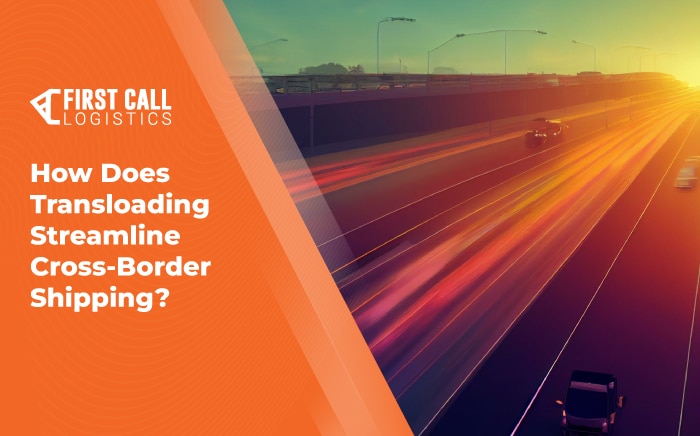How Does Transloading Streamline Cross-Border Shipping?

Major players in the international transport scene (namely automotive, manufacturing and consumer electronics industries) rely on cross-border shipping to move products valued in the hundreds of billions each year, thus boasting some of today’s most cost-efficient cross-border shipping strategies.
Transloading is among the most basic cornerstones of an effective cross-border process — and if it’s good enough for those industries moving products in the 12-figure range, it’s certainly worth a more thorough examination of its benefits and best practices.
Transloading 101
The slightest edge in day-to-day shipping efficiency — or the smallest logistical hiccup — is a big deal to high-volume shippers. Through the use of transloading, shipments are unloaded and repalletized or organized before being loaded (or stored) as new shipments on new trailers ready for final delivery. You may often hear transloading referred to as “cross-docking” — it’s important to note that within the logistics industry these are two separate (albeit similar) things; however, cross-docking does NOT include repalletizing freight.
Transloading is used when regulatory requirements or logistical constraints prevent the use of through-trailer transportation from one country to another. Because transloading naturally requires human handling of a shipment’s contents (and therefore introducing a measure of risk), many shippers partner with a third-party logistics provider to expertly coordinate the sometimes aggravating process of crossing the border.
The shipping process at the border can be cumbersome — we haven’t even brought up the additional paperwork that comes with shipping across the border — but transloading is an everyday operation with significant benefits for shippers when done properly.
Why Transloading Works
Transloading is often done out of necessity, but there are some clear benefits beyond federal border compliance. These include:
- Flexibility. Transloading allows shippers to explore more optimal transportation modes and routes as shipments are safely stored and reorganized.
- Regulatory Compliance. Particularly when it comes to cross-border freight, transloading can alleviate the strain of inspections, documentation and/or customs clearance procedures.
- Consolidation and Distribution. Transloading can lead businesses to consolidate multiple shipments into a single container or trailer, maximizing cargo space and facilitating distribution to various locations post-border crossing.
- Reduced Costs & Route Optimization. Breaking a route up into smaller trips can help shippers locate regional carriers able to move freight at a lower cost, rather than rely on larger international shippers and their elevated rates.
Cross-Border Shipping Considerations and Best Practices
When you embark on a cross-border strategy, there are a few things to keep in mind:
- Invest in Quality Packaging and Labeling.Be sure that every product is properly packaged, labeled, and secured. When goods are moved from one trailer to another, there is the opportunity for mistakes to be made. Planning ahead can help mitigate and minimize the risk of damage or loss during transfer.
- Let a Pro Handle Your Documentation and Customs. Make sure you understand the necessary documentation, customs requirements and regulations for both the country of origin and the destination (reminder: a 3PL can handle this for you). Properly prepare and submit all of the required paperwork to avoid delays or compliance issues, and educate your drivers in what will take place at the border.
- Even If You Do Everything Right, Things Can Go Wrong. Be sure any time-sensitive shipments are allowed enough wiggle room for extra stops and potential delays at the border. Be sure you have access to real-time supply chain visibility to stay informed of your freight’s exact whereabouts.
- Consider an Experienced Logistics Partner. Choose reliable logistics partners, including carriers, freight forwarders and customs brokers, who have experience in transloading as well as cross-border shipping and can save you the stress-headaches involved with navigating customs.
First Call Logistics Offers Cross-Border Services
At First Call Logistics, we’re committed to supporting your supply chain and optimizing freight year-round and across borders. If you’d like to learn more about our international transloading services, please contact our team today.
Simplify your Next Shipment with First Call Logistics
Building and managing cost-efficient supply chains is a full-time job. First Call’s rare combination of in-house assets, expert problem-solving and track record of stellar customer service makes us the 3PL of choice for business partners with a wide range of shipping needs.
More Logistics Resources:
- FCL Guide: Safeguarding Your Business Against Logistics Fraud
- Article: How to Protect Your Supply Chain from Cargo Theft
- Article: Why Supply Chain Visibility Matters
- Article: How Partnering With a 3PL Strengthens Your Supply Chain
- Article: The Shipper’s Guide to Licenses and Endorsements
- Article: Understanding Cross-Docking Services
Get the latest supply chain news and updates directly to your inbox.